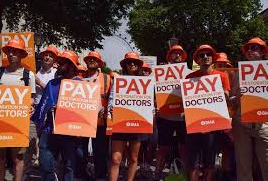
66% of junior doctors back the Government’s pay offer, with key reforms also on the table for the NHS workforce.
Junior doctors in England have voted to accept the Government’s long-awaited pay offer, effectively bringing an end to a protracted dispute that has seen 11 strikes over the past 22 months. The British Medical Association (BMA) revealed that 66% of junior doctors approved the deal, which promises a pay rise averaging 22.3% over the next two years.
The deal includes an immediate pay uplift of between 3.71% and 5.05% for the current 2023/24 pay year, as well as a 6% increase across all pay scales, with an additional £1,000 added to each. These pay rises will be backdated to April 2023. By April 2024, a doctor starting foundation training will see their base salary increase to £36,600, up from approximately £32,400. Meanwhile, doctors entering specialty training will see their base pay rise to £49,900 from £43,900.
The agreement also includes a significant shift in terminology, as junior doctors across the UK will now be referred to as “resident doctors” to better reflect their growing expertise, in response to a motion passed at the BMA’s policy conference last year.
Despite this, the Government has also committed to improving the way in which junior doctors report their additional working hours, ensuring they are compensated accordingly. Additionally, reforms to the rotational training system are set to address the bottlenecks that have contributed to the shortage of senior medical staff.
The BMA has highlighted the significant pay erosion over the past decade, with doctors still 20.8% behind in real terms compared to 2008. Despite this, the co-chairs of the junior doctors committee, Dr Robert Laurenson and Dr Vivek Trivedi, expressed optimism about the future. They called this agreement the first step in the long journey toward restoring fair pay for doctors, acknowledging that while the deal is a step forward, much work remains to be done.
Health Secretary Wes Streeting expressed relief that the pay dispute was resolved before winter pressures on the NHS intensified, stating that the agreement marked a “necessary first step” in his broader plans to reform the NHS and address waiting lists. Amanda Pritchard, CEO of NHS England, echoed this sentiment, calling the agreement “excellent news” for both patients and healthcare workers, and praising junior doctors for their continued dedication.
Despite the resolution, NHS Employers’ Danny Mortimer cautioned that there remains much to address in terms of working conditions and education for resident doctors, but welcomed the stability the agreement provides as the NHS braces for a challenging winter.











